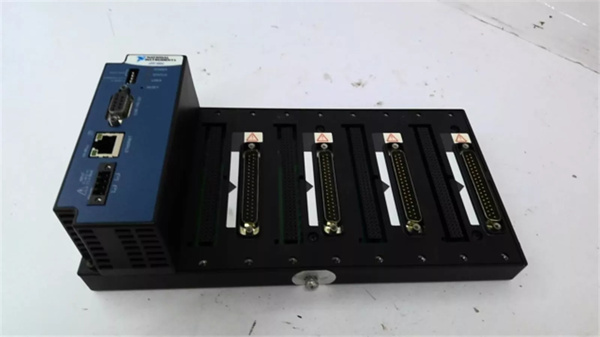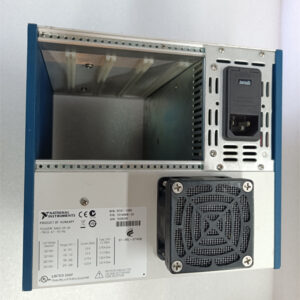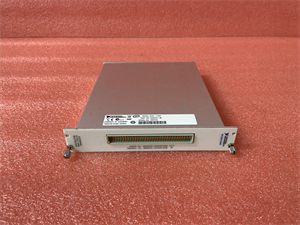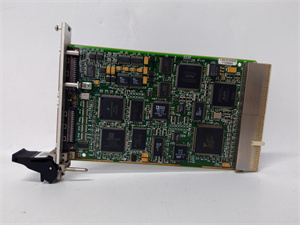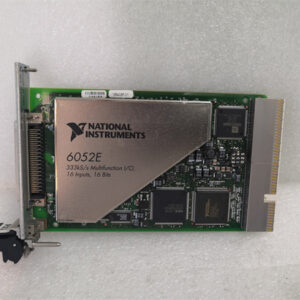Description
Detailed parameter table
| Parameter name | Parameter value |
| Product model | NI CFP-1804 |
| Manufacturer | National Instruments (NI) |
| Product category | Legacy Compact FieldPoint (CFP) Embedded Controller |
| Processor & Memory | CPU: Motorola PowerPC 8245 (300 MHz); RAM: 64 MB SDRAM (expandable to 128 MB); Storage: 32 MB Flash memory (for firmware/configuration) + optional 1 GB CompactFlash card (for data logging) |
| I/O Expansion | 4 × CFP I/O module slots (compatible with C Series analog/digital/counter/communication modules); Supports hot-swappable CFP modules; Max I/O channels: Dependent on modules (up to 64 analog inputs with 4-channel AI modules) |
| Communication Interfaces | Ethernet: 1 × 10/100 BASE-T port (for SCADA integration, Modbus TCP); Serial: 2 × RS-232/485 ports (for Modbus RTU, DNP3); CAN: Optional (via CFP-CAN module); USB: 1 × USB 1.1 port (for local configuration) |
| Real-Time Performance | OS: VxWorks Real-Time Operating System (RTOS); Deterministic task jitter: < 10 µs; Max real-time task update rate: 1 kHz; Supports multitasking (up to 16 concurrent tasks) |
| Physical size | Dimensions (L×W×H): 229 mm × 152 mm × 89 mm (CFP rack-mount form factor); Weight: Approximately 1.2 kg; Mounting: DIN rail, panel, or CFP rack |
| Environmental requirements | Operating temperature: -40 °C to 70 °C (wider range than NI USB-6525); Storage temperature: -40 °C to 85 °C; Relative humidity: 5% to 95% (non-condensing, with dewing); Vibration resistance: 5 g (10 Hz to 500 Hz); Shock resistance: 100 g (11 ms half-sine); IP Rating: IP30 (front panel) |
| Power requirements | Input voltage: 10 VDC to 30 VDC (wide-range industrial power); Typical power consumption: 15 W (without modules), 25 W (with 4 high-power modules); Power efficiency: 80% (power supply conversion) |
| Software Compatibility | Compatible software: LabVIEW 2012+ (with LabVIEW Real-Time Module), NI Measurement Studio; Supports NI-DAQmx for CFP modules; Integrates with Rockwell RSLogix, Siemens Step 7 (via OPC server); Legacy support: LabWindows/CVI 2013+ |
| Safety & Compliance | Compliance: CE, FCC Class A, UL 508, IEC 61010-1; ESD protection: ±15 kV (air discharge), ±8 kV (contact discharge); Overvoltage protection: ±36 VDC (input power); Short-circuit protection (input power) |
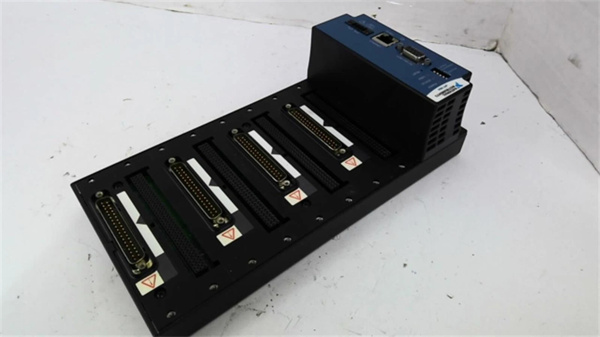
NI CFP-1804
Product introduction
The NI CFP-1804 is a legacy Compact FieldPoint (CFP) embedded controller developed by National Instruments (NI), engineered for rugged, distributed industrial control—filling a gap between portable devices like the NI USB-6525 (USB-powered digital I/O) and lab-focused controllers like the NI PXIe-8861 (PXIe-based). Unlike the NI USB-6525, which is limited to 32 digital I/O lines and benchtop use, the NI CFP-1804 supports 4 hot-swappable CFP I/O modules (analog, digital, CAN) and operates in -40 °C to 70 °C temperatures—making it ideal for remote infrastructure monitoring (e.g., oil pipelines, power grids) and harsh factory automation (e.g., automotive assembly lines).
In industrial workflows, the NI CFP-1804 acts as a “distributed control hub” for legacy CFP systems. For example, in a water treatment plant, it uses 2 CFP analog input modules (connected to its 4 slots) to monitor pH levels and flow rates (12-bit resolution, 100 Hz sampling) and 1 CFP digital output module to control chemical dosing pumps—all while communicating with a central SCADA system via Modbus TCP. Its VxWorks RTOS ensures deterministic control (jitter < 10 µs), a critical requirement for process safety that the NI USB-6525 (dependent on non-real-time Windows) cannot match. Unlike the NI PXIe-8861, which requires a chassis, the NI CFP-1804 is a standalone unit with DIN rail mounting—suited for space-constrained field enclosures.
Core advantages and technical highlights
Extreme Ruggedness for Harsh Field Environments: The NI CFP-1804’s -40 °C to 70 °C operating range, 100 g shock resistance, and IP30 rating make it far more durable than the NI USB-6525 (0 °C to 55 °C, 50 g shock) and even the NI PXIe-8861 (limited to lab conditions). This enables deployment in remote or harsh locations, such as an oil pipeline pressure monitoring station: the NI CFP-1804 operates in -30 °C winter temperatures and 65 °C summer heat, while its vibration resistance withstands pipeline pump vibrations. Without this ruggedness, the NI USB-6525 would fail in extreme temperatures, disrupting critical monitoring.
Modular CFP Platform for Scalable I/O: The NI CFP-1804’s 4 CFP slots support over 50 CFP modules (analog, digital, communication), enabling users to tailor I/O to specific industrial needs—unlike the NI USB-6525’s fixed 32 digital lines. In a manufacturing plant, for example, it pairs with a CFP-AI-111 (4-channel analog input module) to monitor 16 motor temperatures, a CFP-DO-401 (8-channel digital output module) to control conveyor belts, and a CFP-CAN-201 (CAN module) to communicate with industrial robots. This scalability lets users add or replace modules without upgrading the controller—reducing long-term costs compared to the NI USB-6525, which requires external hardware for analog or CAN functionality.
Deterministic VxWorks RTOS for Process Safety: Running the VxWorks RTOS, the NI CFP-1804 delivers < 10 µs task jitter—critical for safety-critical industrial processes (e.g., chemical batch control, power grid load balancing). In a pharmaceutical manufacturing facility, for instance, it executes a 500 Hz PID loop to regulate reactor temperature: the RTOS ensures the loop updates exactly every 2 ms, preventing temperature deviations that could ruin batches. This determinism is a stark contrast to the NI USB-6525, which relies on Windows (a non-real-time OS) and often experiences 100+ ms jitter—making it unsuitable for safety-critical tasks.
Industrial Communication Protocols for SCADA Integration: The NI CFP-1804 supports industry-standard protocols like Modbus TCP/RTU and DNP3—essential for connecting to existing SCADA systems in utilities, manufacturing, and oil/gas. A power utility, for example, uses the controller’s Ethernet port to send substation sensor data (voltage, current) to a central SCADA system via Modbus TCP, while its RS-485 port communicates with local meters via Modbus RTU. The NI USB-6525 lacks native support for these protocols, requiring custom software to integrate with SCADA—adding complexity and cost for industrial users.
Typical application scenarios
In utility grid monitoring, the NI CFP-1804 manages a remote substation’s sensor network. It uses 2 CFP-AI-112 (8-channel analog input modules) to measure 16 high-voltage transformer temperatures and current levels (sampling at 100 Hz), and a CFP-DO-402 (16-channel digital output module) to trigger circuit breakers in case of overloads. The NI CFP-1804’s Modbus TCP port sends real-time data to a utility SCADA center, while its VxWorks RTOS ensures circuit breaker triggers occur within 50 µs of an overload—preventing transformer damage. Unlike the NI USB-6525, which would struggle with analog inputs and SCADA communication, the NI CFP-1804 integrates seamlessly into the utility’s legacy infrastructure.
In automotive assembly, the NI CFP-1804 controls a robotic welding station. It pairs with a CFP-AO-201 (4-channel analog output module) to adjust welding torch voltage/current, a CFP-DI-331 (16-channel digital input module) to read weld position sensors, and a CFP-CAN-201 (CAN module) to synchronize with the welding robot. The NI CFP-1804’s -40 °C to 70 °C operating range withstands the station’s heat (from welding arcs) and cold (winter factory temperatures), while its deterministic control ensures consistent weld quality. This application leverages the controller’s modularity and ruggedness—advantages the NI USB-6525 (limited to digital I/O and benchtop use) cannot provide.
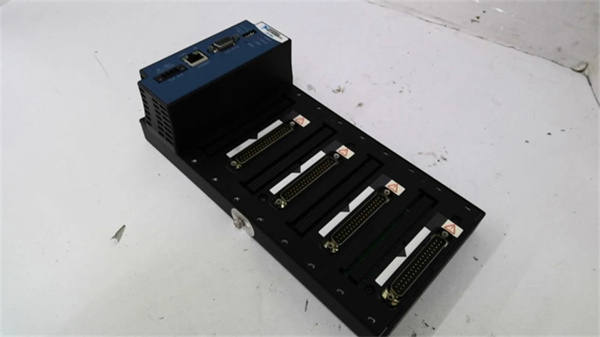
NI CFP-1804
Related model recommendations
NI USB-6525: A portable USB I/O device complementary to the NI CFP-1804 for field service. Technicians use the NI USB-6525 to troubleshoot NI CFP-1804-based systems (e.g., testing digital I/O lines) without disconnecting the controller from the industrial network.
NI CFP-AI-111: A CFP 4-channel analog input module (12-bit, ±10 V) designed for the NI CFP-1804. It adds low-level sensor measurement (e.g., thermocouples, pressure transducers) to the controller—expanding its capabilities beyond the NI USB-6525’s digital-only I/O.
NI CFP-DO-401: A CFP 8-channel digital output module (24 VDC, 0.5 A per line) for the NI CFP-1804. It drives industrial actuators (e.g., solenoids, relays) directly—eliminating the need for external drivers required by the NI USB-6525.
NI CFP-CAN-201: A CFP CAN communication module for the NI CFP-1804. It enables the controller to interface with CAN-based industrial devices (e.g., robots, vehicles)—a feature the NI USB-6525 lacks without a USB-to-CAN adapter.
NI PXIe-8861: A PXIe controller that replaces the NI CFP-1804 for lab-based pre-development. Engineers prototype control algorithms on the NI PXIe-8861 before deploying them to the NI CFP-1804 in field environments.
NI LabVIEW 2012+: Legacy LabVIEW version compatible with the NI CFP-1804. It provides tools to program real-time control loops and configure CFP modules—critical for integrating the controller into industrial workflows.
NI CFP-1380: A 8-slot CFP rack for the NI CFP-1804. It expands the controller’s module capacity to 8 slots, enabling larger-scale systems (e.g., 32 analog inputs, 16 digital outputs) beyond the NI USB-6525’s capabilities.
NI USB-6210: A portable DAQ device for calibrating NI CFP-1804 systems. It verifies the accuracy of CFP analog modules (e.g., NI CFP-AI-111) to ensure compliance with industrial standards.
Installation, commissioning and maintenance instructions
Installation preparation: Before installing the NI CFP-1804, confirm the environment meets its rugged specifications (-40 °C to 70 °C, 5–95% RH). Mount the controller via DIN rail (included brackets) or panel—ensure 100 mm clearance around the unit for airflow. Insert CFP modules into the 4 slots: align the module’s guide pins with the controller’s slots, push until it clicks, then secure with the front-panel screw. Wire sensors/actuators to the modules (follow module-specific wiring guides), and connect 10–30 VDC industrial power to the controller’s power input—use twisted-pair, shielded cables to minimize noise. Connect an Ethernet cable to the controller’s 10/100 BASE-T port for configuration, then install LabVIEW + LabVIEW Real-Time Module on a host PC. Use NI Measurement & Automation Explorer (MAX) to detect the NI CFP-1804 and deploy the VxWorks firmware (if not pre-installed).
Maintenance suggestions: Inspect the NI CFP-1804’s Ethernet and serial ports quarterly: clean contacts with isopropyl alcohol (99.9% purity) and a lint-free cloth to remove dust or industrial debris. Check CFP module connections monthly—ensure they are fully seated to prevent I/O disconnections in vibrating environments. Calibrate CFP analog modules (e.g., NI CFP-AI-111) annually using a NIST-traceable voltage reference (e.g., NI 9172) to maintain measurement accuracy. If the NI CFP-1804 experiences communication issues, update its firmware via MAX or verify the power supply (ensure stable 10–30 VDC). Avoid exposing the controller to temperatures above 70 °C or humidity above 95%—extreme conditions can damage the PowerPC processor or flash memory. Backup the controller’s configuration and firmware monthly (via MAX) to prevent data loss in case of flash failure.
Service and guarantee commitment
National Instruments (NI) provides a 1-year standard warranty for new NI CFP-1804 units (limited stock for legacy products), covering defects in the processor, CFP slots, communication ports, and power supply. For extended protection, the Legacy Industrial Support Plan extends coverage to 3 years, including annual calibration of CFP modules (when purchased with the controller), priority technical support (4-hour response time for utility/manufacturing customers), and expedited repairs (parts subject to availability).
NI’s legacy technical team includes industrial control specialists, offering 24/7 support for the NI CFP-1804—assisting with VxWorks programming, Modbus configuration, and module troubleshooting (e.g., resolving analog signal drift). Customers gain access to archived resources: legacy application notes on SCADA integration with the NI CFP-1804, LabVIEW example code for PID control, and a community forum for sharing legacy CFP best practices. For out-of-warranty repairs, NI’s Legacy Industrial Restore Service (when parts are available) replaces aged components (e.g., processor, power supply) and verifies real-time performance—restoring the NI CFP-1804 to factory specs. This commitment reflects NI’s dedication to supporting users with legacy industrial systems that rely on the controller for critical monitoring and control.
